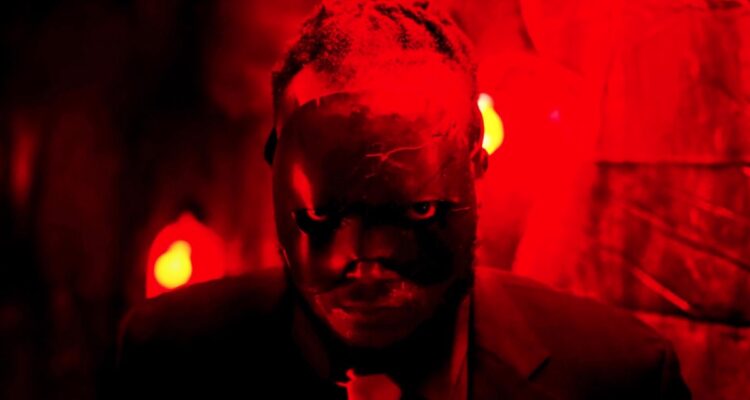From the moment Tony Todd, playing Titus Darq, a pencil mustache master of ceremonies hosting a “Good Horror Movie Night,” appears on the screen with a Vincent Price inspired cackle, you know Bill Posley’s hilarious homage to 1990s Black horror, “Bitch Ass,” knows exactly what movie it wants to be. In his opening welcome, accentuated by comical splashes of thunder, the keys of a creepy piano, and the nostalgic buzz of a VHS tape, Darq makes allusions to “Candyman,” “Tales from the Hood,” “Bones,” and so forth to prime viewers for Posley’s deliciously schlocky vision. The first act of this bloody, sensationalist SXSW premiere takes you on a familiar stroll.
READ MORE: 2022 SXSW Film Festival: 15 Must-See Film & TV Projects
The lineage of Black hood-horror films, typically set in a gang-dominated neighborhood, reflexively recalibrates the real-world horrors of the area — acutely felt by the inhabitants and flatly demonized by white outsiders — for frights. The assured script by Posley and Jonathan Colomb trades in those same techniques for surprising laughs, and real gory cries. It opens in 1999 with a woman frantically running from a mugger. The extreme letterbox frame, stylistically divided into strips, each depicting a different angle of the action, a trick Posley will return to for more extravagant shapes and actions, gives the boilerplate scene a necessary pulse. The thief thinks he has the drop on the woman until a big, hulking masked man emerges from the shadows and drags him into a shed.
The ragged, generic production design in the first twenty minutes of this low-budget horror makes it hard to totally settle into the film’s wavelength. Still, Posley dutifully builds out common tropes, which pay much bigger dividends later. Early on, in the heavily graffitied living room of an abandoned building, a trio of new recruits are lectured by the foreboding gang leader, Spade (Sheaun McKinney). A frantic Q (Teon Kelley) arrives late. This motley crew is a combination of gangland parodies, such as Tuck (Kelsey Caesar) and Cricket (Belle Guillory), and unlikely individuals like the Falstafian Moo (A-F-R-O) and the straight-edge Q — who have a chance to join the gang.
The scene reinterprets the genuine fears of initiation with punchlines, as Spade, fiddling with a rubik’s cube, pumps up a quartet clearly doomed to flounder. A rich lady has just kicked the bucket. And rumor has it her house holds untold riches. For 666, their initiation night, Spade tasks the group with looting the nearly empty abode. One problem looms, however: The woman’s doting son Cecil (Tunde Laleye), derided as “Bitch Ass,” still lives there. But Spade thinks very little of him. For Q, the crime carries grave risks. He’s a straight-A student. And the goal of breaking-and-entering barely fits his unassuming, clean-cut frame.
Posley and Colomb’s script forces Q into the house by relying on well-worn genre conceits: Q’s mother, Marsia (Me’Lisa Sellers), desperately trying to keep her good son away from the dangerous streets, works two jobs. The promising scholarship Q hoped would propel him to college has come for naught. And the world-weary Tuck, Q’s cousin, is depending on him for backup. These characters rarely break out of their stated functions, but when they do, they discover new shades: Cricket, for instance, is intending to use her cut of the loot to marry her girlfriend. Moo wants to catch beachside sunsets, far away from the cluttered neighborhood.
The filmmakers also create a poignant and tragic backstory by taking inspiration from Daniel Mann’s “Willard,” for the film’s titular character. See, 20 years ago, Cecil (played by the younger Jarvis Denman Jr.) lived in a brutal God-fearing home, wherein his grandmother abused him and local bullies like his classmate Spade mercilessly picked on him. Cecil loves board games and hopes to one day design them. He also carries a crush on a local girl. Denman, who provides the best performance of the movie through his modest movements and lithe facial expressions, imbues the misunderstood character with real pathos, perfectly setting up his later, gruesome fall.
Despite his immense presence and the ways he modulates his voice for gravelly undertones, Bitch Ass never comes off as wholly intimidating. Instead, Laleye might have played a better Cecil, if the part weren’t already taken by Denman, than a masked serial killer in the vein of Jason. Laleye does emote pain well and carries the gnarly physical components of the character too, and that’s enough to turn in a steady, workmanlike performance.
And while it’s intriguing to have cinema’s first Black, masked killer, the filmmakers aren’t terribly interested in what the title is exactly supposed to mean. Luckily, the idea of turning Bitch Ass’ entire home into an elaborate, religiously inspired kill room, is an inspired choice. As is making his shed an intricate underground lair. The brilliant redesigning of the children’s games, taking inspiration from Operation, Jenga, and so forth, are delectably flexed for better frights, gallons of blood, and sturdy practical effects. DP Steven Parker shoots almost exclusively with a fish-eyed lens, adding deeper mysteries in the bowed corners of the frame.
“Bitch Ass” can lack the grounded political context of the genre, merely wearing the clothes of style for an unfulfilling slightness. Even so, even as each member of the quartet is picked off by Bitch Ass, the revenge plot’s appeal lies on more wholesome ground. Amid an absurd twist, partially and intentionally played for laughs, is a story about maternal love and the ways cycles of generational trauma can lead to greater pain. While it’s odd how little sympathy is shown for Bitch Ass toward the film’s end — Was he morally right? No. Was he still a victim? Yes — the aesthetic panache and wild abandonment, along with the tease of a larger anthological universe, makes Posley a new, exciting name worth remembering in the horror field. [B-]
Follow along for our complete coverage from the 2022 SXSW Film Festival.

